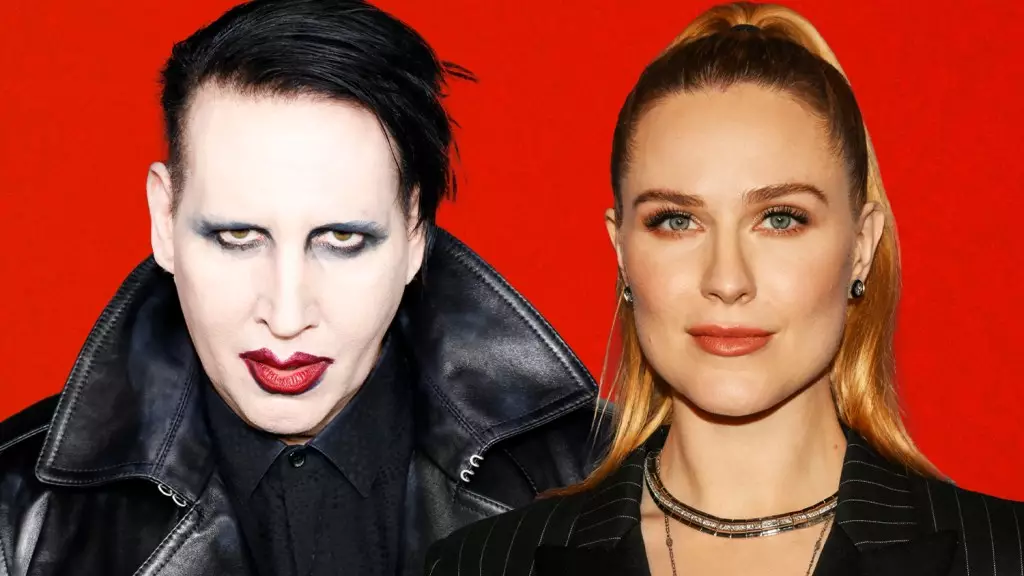Evan Rachel Wood’s recent revelations in the Channel 4 documentary series “Marilyn Manson: Unmasked” have ignited a firestorm of public interest and scrutiny. The first episode, which aired to a significant viewership, presented a raw account of Wood’s experiences with the controversial musician Marilyn Manson during the filming of his 2007 music video for “Heart-Shaped Glasses.” In an era where conversations about consent and sexual violence are at the forefront of societal discussions, Wood’s poignant narrative unfolds layers of complexity regarding the interactions between celebrities, power dynamics, and personal trauma.
Wood, long an outspoken critic of Manson, recounted feeling “violated” during the video shoot, where the atmosphere shifted dramatically once filming began. She expressed that she refrained from labeling the experience as rape for years, emphasizing the emotional turmoil that often accompanies such traumatic events. The dichotomy between how incidents are perceived—both by the individual experiencing them and by society at large—reveals the significant obstacles faced by survivors when seeking to articulate their pain.
The allegations provide a chilling insight into the potential dissonance between artistic intention and personal safety. Wood described the initial agreement as one that entailed a blurred depiction of intimacy, cleverly pitched to underscore its artistic nature. However, once the cameras were rolling, the experience rapidly devolved into an encounter characterized by aggression and disregard for her boundaries. This situation raises crucial questions about the true nature of consent in creative environments, particularly where power imbalances are evident.
In the realm of entertainment, where artists often wield significant influence, the lines of consent can become alarmingly blurred. Wood’s experience serves as a reminder of the necessity for explicit and informed consent—especially in contexts that involve vulnerability and personal exposure. It compels audiences and industry professionals alike to reconsider established norms surrounding artistic production and the treatment of collaborators.
In tandem with Wood’s gripping narrative, Manson’s legal team has staunchly defended him, asserting that the accusations are “demonstrably false.” Manson’s lawyer, Howard King, pointed to the presence of multiple witnesses during the shoot and the absence of corroborating support for Wood’s story as critical elements in their argument. Importantly, King’s assertion sheds light on a frequent occurrence in cases of sexual misconduct, where the burden of proof and validation often falls disproportionately upon the survivor.
This defense approach underscores the complexities victims face in navigating a legal system that demands empirical evidence of wrongdoing while grappling with the emotional ramifications of their experiences. It provokes a broader discussion about societal attitudes toward allegations of abuse and the inherent skepticism that may accompany them, particularly in high-profile cases featuring celebrities.
Wood’s revelation is part of a larger narrative that has seen numerous women come forward with similar accusations against Manson. The proliferation of these accounts has sparked not just public outrage, but also substantiated discussions about the culture of silence that often surrounds sexual violence in the entertainment industry. The intricate web of power, fame, and vulnerability reflects societal failings to protect those who are often most at risk—individuals within creative industries who may find their voices stifled by fear of retribution or disbelief.
Following Wood’s public naming of Manson as her alleged abuser in 2021, the dynamics of their legal battles became equally pronounced. Manson’s choice to terminate a defamation lawsuit against Wood suggests a shift in strategy amid mounting public scrutiny and the considerable financial burden of ongoing legal disputes. This decision not only resonates with Wood’s quest for justice but also emphasizes the detrimental impacts lengthy legal proceedings can have on personal wellbeing.
As viewers digest the unfolding story through the lens of “Marilyn Manson: Unmasked,” the implications are profound. It is vital to engage with these narratives thoughtfully, recognizing the complexities of human interactions, the importance of consent, and the duty to support survivors in their journeys. This documentary series is not just about two individuals; it opens up essential conversations about power dynamics, accountability, and the importance of believing survivors, ultimately urging society to reflect deeply on how we address issues of abuse and consent within the realms of art and life.

Leave a Reply